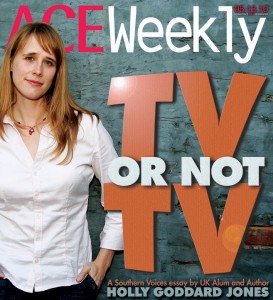View PDF Ace May 13, 2010 coverstory essay by Holly Goddard Jones
GOODBYE DIXIE,
Hello Dancing with the Stars
BY HOLLY GODDARD JONES
I‘ve been wanting to write a little tribute to Dixie Carter ever since hearing about her death, but the semester got in the way, as semesters tend to. So this comes late, but it’s still heartfelt. I grew up on TV, and when I say that I mean that my family life pretty much revolved around it: we ate many, if not most, of our meals in the living room where we could watch it, it went on when we got out of bed, and it went off when we got ready to turn in.
We subscribed to TV Guide. My family didn’t go to movies or football games or to play miniature golf. My parents didn’t, for most of the time I lived at home, have friends that they socialized with in the evenings or on weekends. They were wrapped up in each other; as a couple they focused on their children, and as a family we focused on the tube. There were a few other things in our lives — trips to the library and to Wal-Mart, a weekly excursion to Bowling Green for a meal out and a walk through the mall — but TV was the primary source of entertainment and instruction. It tended to be on even if no one was watching it.

In fact, I’m amazed when I do a quick mental tally of popular shows from my childhood. Who put them on the air? How on Earth were they successful? Golden Girls, which ran from ’85 to ’92, shouldn’t have had a thing to offer a little girl, but I loved it — and I also loved Dixie Carter’s Designing Women, which ran from ’86 to ’93. Murphy Brown (’88-’98) was a favorite, but the best of the best was Roseanne (’88-’97), a show that I felt an unsurprising kinship with because, as my mom liked to say, it was “about people like us.”
These shows were all helmed by women— a remarkable fact all on its own. But even better, the women on these programs were dynamic and interesting, and their concerns weren’t merely or even primarily romantic. Golden Girls was of course about retirees living in Florida, and Designing Women centered on a business and the female staff that owned and operated it. Murphy Brown was about a journalist, and Roseanne was about the home, work, money, and relationship problems of a working class woman and her family. None of the women on these shows was in her 20s; none was conventionally beautiful, and Roseanne, even after the actress portraying her had work done, was overweight and completely average—the woman you might see folding clothes at the table down from yours at the Laundromat or at the grocery, checking the expiration date on a red-tagged package of chicken thighs. None of the shows was set in New York or Los Angeles. And best yet, the characters were flawed, not saintly; they had backstories.
If you look at the current Nielsen ratings today, most of the network programs in the top 25 are either reality shows about dancing or singing, one-hour dramas such as House, CSI, and The Mentalist, which are anchored by a male lead, or sitcoms with male-heavy ensemble casts such as The Big Bang Theory and Two and a Half Men. The very popular Glee, which I’ve watched intermittently, depicts its male characters as charmingly bumbling and well-intentioned and its female characters as narcissistic, deceptive, and bordering on sociopathic. I won’t say, of course, that there’s nothing on television that depicts women as strong and layered protagonists, but I think that I’m safe in suggesting that it’s not the norm.
Dixie Carter’s Julia Sugarbaker, then, along with Murphy Brown and Roseanne Connor, was one of my idols. Fans of Designing Women will recall that, at least once every few episodes, Julia would have A MOMENT, which Carter portrayed with a fiery, “I’ll never go hungry again” Southern over-the- topness that was saved from ridiculousness by Carter’s clear intellect and sense of ironic fun. I loved when Julia Sugarbaker got on her soapbox, because she was always saying with an unearthly eloquence something that mattered, usually to a person who really, really needed schooling.
I went to YouTube and watched some old clips of Dixie Carter in Designing Women, and I still get goosebumps seeing her do her thing. To analyze it would be to kill it, but there’s some combo here—timbre of voice, the slow build, an oscillation between fast and slow that one associates with a Baptist preacher — that is surprising and, in the person of an elegant, mature woman, breathtaking. She reminds me a bit of another southern favorite of mine, Jerry Clower, whose comedy bits usually crescendoed in similar fashion. But Carter, as Julia, was all her own, and decidedly feminine. Her rhetorical power wasn’t merely a knock-off of masculine models: it was womanly and Biblical and intellectual, a combination pulled off between the writers of the show and this actress with the mind and heart to really feel what she was saying. I adored it. I still do.
As a girl, I pretty much knew from the start that I could do whatever I wanted to do with my life. That is due in large part to my wonderful parents, who, though cautionary realists, always encouraged me; but I also—can I say this?—was lucky to have good models on television, characters who cared about more than clubbing and texting and finding a new guy to pursue.
I’m sorry for the young women raised on a diet of The Hills; even 90210 had more to redeem it. I’m glad for shows like Designing Women, and I’m sorry to have lost a woman like Dixie Carter, who brought to life Julia’s fire, smarts, and independence. ■
[amazon asin=0061776300&template=iframe image]Holly Goddard Jones is a Kentucky native, a University of Kentucky alum, and an author. Her first book, Girl Trouble, a collection of short stories, was released last Fall by Harper Perennial, and was recommended in Oprah Magazine. The title story, “Girl Trouble” is up for the Frank O’Connor short story award.





